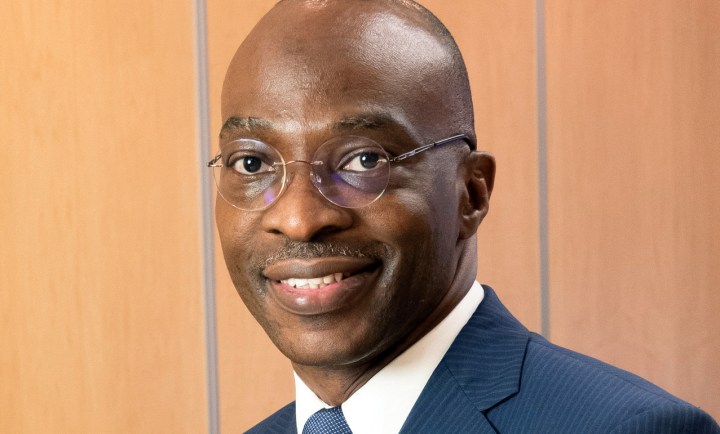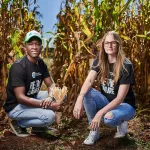OUTSTANDING SCHOLAR
Honoured University of Pretoria professor on a mission to inspire emerging scientists and tackle historical imbalances

Professor Olalekan Ayo-Yusuf was recently inducted as one of 29 members of the Academy of Science of South Africa.
Professor Olalekan Ayo-Yusuf, the head of the School of Health Systems and Public Health at the University of Pretoria (UP), has been recognised as one of South Africa’s outstanding scholars.
He now hopes to inspire emerging scientists to strive for excellence in a quest to address historical imbalances in the representation of black Africans in the public health professoriate.
The plight of several patients suffering from oral cancer in rural Limpopo as a result of the regular use of smokeless tobacco or snuff two decades ago prompted Ayo-Yusuf (53) to conduct research and further his studies in public health. He has a primary qualification as a dentist, and was inducted as one of 29 members of the Academy of Science of South Africa (ASSAf) last month.
ASSAf’s core function is to honour the country’s most outstanding scholars from various disciplines by electing them to membership of the academy.
“Membership of the academy is a great honour and is in recognition of scholarly achievement. Members are the core asset of the academy and give of their time and expertise voluntarily in the service of society,” the academy said.
Speaking to DM168 days after receiving the honour, Ayo-Yusuf said: “I was quite excited and felt very honoured to be able to add my voice to ASSAf’s excellent record of addressing societal challenges of national and international importance.”
After obtaining his master’s degree in dentistry in 1998 from UP, Ayo-Yusuf said he decided to pursue a career in public health. He received his PhD in health promotion from Maastricht University in 2008. After that, he immediately went on to the Harvard School of Public Health in the US for postdoctoral fellowship training in public health practice, and returned to South Africa in 2010.
He then took up several positions, including deputy vice-chancellor of Sefako Makgatho Health Sciences University from 2017 to 2021, after which he rejoined UP to continue his academic and research programme.
Read in Daily Maverick: “African scientists and technology could drive future black hole discoveries”
“While studying and solving real-life problems, I was motivated to pursue an academic career in order to be able to pass on my knowledge to others and replicate myself somewhat. Part of the challenge experienced in the rural areas was seeing a number of patients with oral cancer in the course of my professional service, which I associated with the regular use of smokeless tobacco or snuff in the mouth,” he said.
He has a wealth of knowledge, but said this recent honour was different: “I have received a number of recognitions for my research and service to the profession, but this was very different, as it provides a home of like minds irrespective of their professional discipline and a community of nationally and internationally distinguished scientists with the intellectual capital dedicated to the good of the society.”
Ayo-Yusuf says that with the honour he hopes to inspire more emerging scientists to strive for excellence, particularly black Africans.
Visit Daily Maverick’s home page for more news, analysis and investigations
“This is important as we address the historical imbalance in representation of black Africans in the professoriate and by implication in the academy’s intellectual engagements on solutions for development challenges affecting our society, including in the broader African region.
“I therefore hope that my membership of ASSAf [will] contribute to UP’s strategic intent of strengthening the university’s responsiveness and impact on society,” he told DM168.
Challenges
Ayo-Yusuf admits the country continues to grapple with several challenges including that “people still think in disciplines and my area of work, which is mainly in addressing risk behaviours for non-communicable diseases (NCDs), particularly the use of tobacco and alternative nicotine delivery systems that have been associated with cardiovascular diseases and addiction”.
In the same breath, Ayo-Yusuf appreciates the gains made by the country in the area of NCD control, which he says might have been negated by the Covid-19 pandemic, since having any of these NCDs was a significant risk for severe infection and death.
“Yet, some of the restrictions and rationalisation of the health services to accommodate the large number of Covid-19 cases meant some people could not access their chronic medications.
Read in Daily Maverick: “Meet two pioneering South African university Vice-Chancellors blazing the global science trail”
“It would also appear that the severe mental stress experienced by many and the fact that the tobacco industry took advantage of the period to promote its products in indirect ways might have been associated with an increase in smoking in South Africa, as suggested by recent estimates from the Medical Research Council.
“The increase in the purchase of very cheap cigarettes [which often meant excise tax was not paid or these were illicit cigarettes], is also a challenge for tobacco control and hence non-communicable disease control in South Africa.
“Supported by evidence from several of our studies, a major stride made in the country is the increased capacity developed for tobacco control policy advocacy that has seen the recent approval of the new Tobacco Products and Electronic Delivery Systems Control Bill by Cabinet, which will hopefully soon be debated and passed into law by Parliament [after the concurrence of the National Assembly and the National Council of Provinces],” said Ayo-Yusuf. DM168
Other top South African scholars honoured
Professor Karen Barnes: Professor of clinical pharmacology, Health Sciences Faculty, University of Cape Town.
Professor Deevia Bhana: DSI/NRF South African Research Chair in gender and childhood sexuality, University of KwaZulu-Natal.
Professor Ronelle Carolissen: Clinical psychologist and professor of psychology, Department of Psychology, Stellenbosch University.
Professor Rituparno Goswami: Professor and academic leader of mathematics, statistics and computer science, University of KwaZulu-Natal.
Professor Stan du Plessis: Professor of economics, Stellenbosch University.
Professor Karen Esler: Distinguished professor of conservation ecology and entomology, Stellenbosch University.
Professor Sarah Gravett: Professor of education, Faculty of Education, University of Johannesburg.




















Comments - Please login in order to comment.